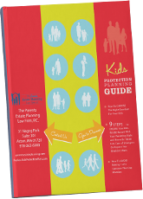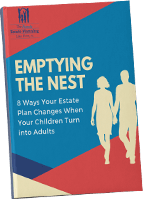by Ann-Bailey Lipsett, M.Ed., of Lipsett Learning Connection
Kindergarten is one of the most exciting years of our children’s lives! They are beginning their educational journey, and are excited about every piece of their new world, from riding the bus to meeting new friends.
For parents, it can be a bit more nerve racking. We wonder if our child is ready, if he or she will listen to the teacher, or share with the other kids. We want to prepare them as much as possible so they will have a successful year, but often we put our energy into making sure they know their letters and numbers. Yet the academics will come throughout the kindergarten year. There is no need to rush. What will help your child have a smooth transition will be to practice independent skills with your child that will allow him/her to take care of his/her own needs, advocate for him/herself, and feel successful in the new environment.
Many of these tips are aspects of daily life that will come easily to your child once you introduce them, but as adults we tend to forget to hand over the responsibility. Without even thinking we still check in with our kids or talk them through tasks they could otherwise do independently.
Here are some nonacademic skills that may help pave the way for a smooth and successful transition into Kindergarten:
Practice independent eating
Can your child get through a meal fairly independently without the constant coaching of “two more bites, great, now one bite of broccoli, now one bite of cheese…”? To practice this, have one of your child’s friends over for lunch, serve the food and then stand back. Can your child navigate his/her way through the food without your gentle reminders? Give a five minute reminder that lunch is almost over. When the five minutes is up clean up from lunch and see what your child ate. Was it enough to get him/her through a busy afternoon? In kindergarten, it is difficult for teachers to coach all the children through their lunches. If they notice a child hasn’t eaten much they’ll give reminders and warnings of how much time is left, but they can’t individually remind each child to eat. Start preparing your child to become an independent eater so that he/she will not end up hungry at the end of the first few days.
Practice independent food choices
If your child is going to eat in the cafeteria he/she will be presented with all sorts of food choices. The teachers will be there to help remind the children to make a choice, but they will not have any idea what your child likes/doesn’t like. Go to a buffet type restaurant where your child can practice making independent choices quickly. Once your child makes a choice, will she/he eat what’s on the plate? If not, talk to your child about the choices he or she made and suggest ways to make a better choice next time. Sometimes children will choose a food they do not like because it comes with a bag of chips or just looks good. Talk to your child about how to make choices they know they will eat.
Practice public restroom independence
Many kindergarten classrooms have bathrooms in the classroom, but some use a group bathroom in the hallway. Take your child to a public restroom and just stand back. See if he/she can follow the process go in, shut and lock the door, wipe, flush the toilet, wash and dry hands in the sink, independently. Unless your child is in a single sex classroom it is unlikely that the teacher will be a part of the group bathroom experience.
Allowing for self-help independence
Many kinders come to school being able to take care of 95% of the bathroom process, but many are still accustomed to being wiped when they have a bowel movement. Start coaching your child to do this independently, including having her pull up pants without you checking to see if she did a good job. You don’t want your child opening the classroom bathroom door and screaming, “Come check me, please!” with all the other children around.
Encourage advocating for own needs
Are you always acting as your child’s spokesperson? Do you know when your child is hungry or needs to go to the bathroom without your child even saying a word? Do you get your child a tissue when you notice his nose is starting to run? Start teaching your child simple sentences he can use to let adults know what he needs. Practice these at the public library or when ordering food. Can your child ask the librarian for a tissue?
Most importantly, does your child recognize when she needs to go to the bathroom? Stopping and taking care of their own needs is a hard skill for some children to learn, especially when they are in the middle of an exciting activity. Do you always have to remind your child to go to the bathroom? Have you learned your child’s ‘I need the bathroom signs’ so that you’re always the one reminding your child to go? This summer, start coaching your child through noticing the bathroom need and going independently. If this is still hard once school starts, talk to the teacher. Explain that you are working on this skill but that your child might need reminders.
Investigate naps
Find out if your kindergarten program has afternoon naps. Many don’t anymore. If not, start weaning your child from the afternoon nap in August. Move to having an afternoon quiet time where your child sits quietly reading books.
Set up an early bedtime routine
Your child is going to be working like crazy in kindergarten. From constantly sharing toys, following directions, staying in line, sitting in a seat, and exercising all that impulse control, your child will need every ounce of energy possible. In mid-August, start preparing a steady nighttime routine with a good 7:30 or 8:00 bedtime to guarantee that your child will be well rested for school.
Set up a calm morning routine
This summer, establish a calm morning routine to get everyone out of the house smoothly. When your child has a rough morning at home it can stay with him/her all day. Practicing those morning routines now will make it easier when school actually starts.
Practice a goodbye routine
Saying goodbye to your child on the first day, or even every morning can be difficult. Read The Kissing Hand by Audrey Pen and start practicing having your own kissing hand routine. Having that in place will make the morning goodbyes easier and less traumatic. You can also give your child a choice of how to say goodbye. “Do you want to say goodbye in the car or on the sidewalk? Do you want to a hug or high five?” Asking children to consider a choice will often take their mind off of being sad while they think about their options. It also gives them control of the situation.
It’s going to be an AMAZING year! Your child is going to grow in ways you didn’t think possible. You are going to hear crazy stories about the inner workings of kindergarten. 50% will be true, 30% will be what your child WANTS to be true, and 20% will be grounded in reality with some extra details added in. You are going to watch your child want to wash his/her hands the way “Miss Miller taught me” even if it is the same exact way you’ve been trying to get your child to wash his/her hands for five years. You are going to hear new songs, hear about new books, hear the same classmates’ names over and over again, and hear the phrase, “Miss Miller says….” until you think your head will explode. You will get art project after art project long after your fridge is full. If all goes well you’ll have a happy, independent, and excited five year old who’s ready for their next 12+ years of schooling.
Ann-Bailey Lipsett, M.Ed., is a former teacher and school administrator, and the founder of Lipsett Learning Connection, a special education service with a mission to empower families and caregivers to give their child the support, learning opportunities and skills needed to live a full, literate, and enjoyable life. In this enterprise, Ann-Bailey coaches parents create strong plans to foster their children’s academic and social/emotional needs. She has a Master’s Degree in special education from the University of Virginia and is a graduate of Washington and Lee University.













